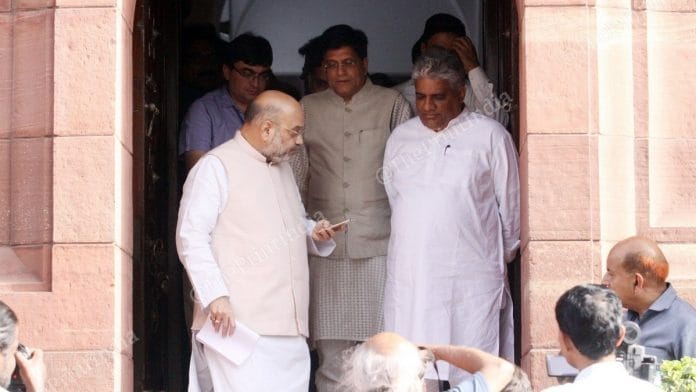New Delhi: The assembly elections in Jammu and Kashmir are likely to take place by the end of the year, Union Home minister Amit Shah said in the Lok Sabha Friday while moving a statutory resolution for a six-month extension of President’s rule in the state beginning 3 July.
Explaining the reasons for not holding elections until then, Shah said that both the Election Commission of India and the Jammu and Kashmir administration did not recommend elections because of Ramzan, the Amarnath Yatra and the shifting period of the Gurjar Bakharwal community.
“Ramzan was observed between 7 May and 4 June. From 30 June to 15 August, the Amarnath yatra will take place in the state,” Shah said. “I would also like to add that the Gurjar Bakharwal community that shifts to the hills comprise 10 per cent of the population. They come back only after October. So, the election is not recommended even by the EC and the J&K administration.”
Shah claimed that there has been a precedent in the past three decades in that elections have never been held in the state in the months to come. “This is not the first time that elections have not taken place in the months to come. And neither is it the first time that the state has seen President’s rule,” he said. “The state has seen Governor’s rule on seven occasions and President’s rule twice. There was a period when for six years there was no election.”
Congress slams decision
Speaking later, Congress leader Manish Tewari criticised the Modi government’s move, saying that in its fight against terror, the government needed the support of the people of the state. He said that the 1992 assembly elections proved the turning point in the state as it enabled the government to crush terrorism in the state in the next three years, while emphasising the need for holding assembly elections in J&K. Tewari also alleged that the BJP-PDP alliance in the state was responsible for the current state of affairs.
“It was in 1990 during the V.P. Singh government, supported by the BJP and the Left, that the situation in Jammu and Kashmir began deteriorating. It was former PM Atal Bihari Vajpayee’s doctrine of Insaniyat, Kashmiriyat, Jamhooriyat that led to the government giving passage to Hizbul deputy commander Majeed Dar for talks,” Tewari said. “The initiative was of the NDA government and was continued by the Manmohan Singh government. Between 2005 and 2008, the state witnessed a golden period.”
Tewari also accused the Modi-led BJP government of not taking the well being of the residents into consideration.
Opposing the arguments put forth by Tiwari, the BJP MP from Maharashtra, Poonam Mahajan, accused the Congress of alienating the state from the rest of the country.
“Syama Prasad Mookerjee sacrificed his life for the state. There was a time when you required a permit to enter the state and one could not hoist the national flag as well,” Mahajan said.
Amendment to the Jammu and Kashmir Reservation Bill, 2019
Shah also moved an amendment to the reservation policy in the state. The amendment seeks to provide a quota to those living along the international border in Jammu and Kashmir.
“The state of Jammu and Kashmir has a vertical reservation policy which stands at 43 per cent,” Shah informed the House. “The break up is like this — 8 per cent for Scheduled Castes, 10 per cent for Scheduled Tribes, 20 per cent for Other Backward Classes, 2 per cent for weaker and poor sections and three per cent for those living on the Line of Control (LoC).”
Moving the amendments, Shah said the 3 per cent LoC reservation will now include all those living on the international border as well. “Reservation should benefit everyone living along the borders, be it the LoC or the IB as they all face the same problems and hardships,” Shah said. “Around 3.5 lakh residents in the villages of Kathua, Samba and Jammu will benefit from this amendment.”
Also read: Modi govt shows shift in Kashmir policy but a lot depends on Hurriyat, and Amit Shah






